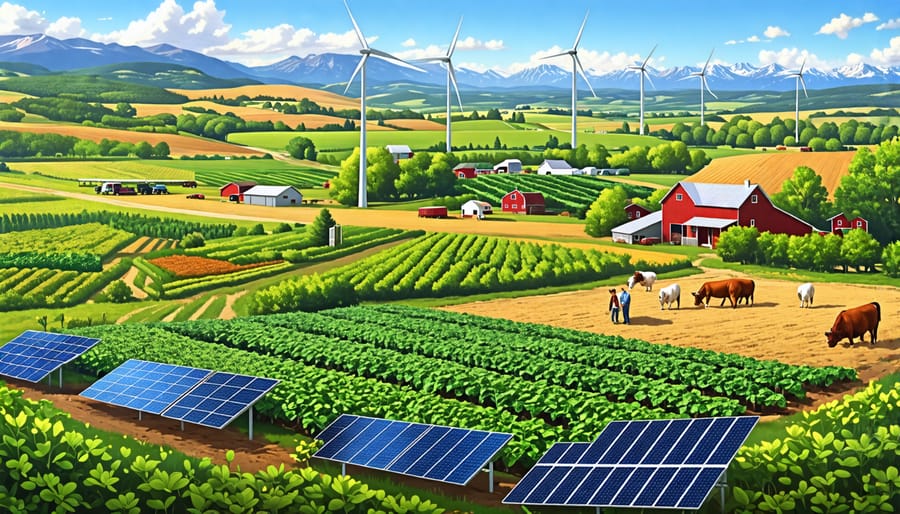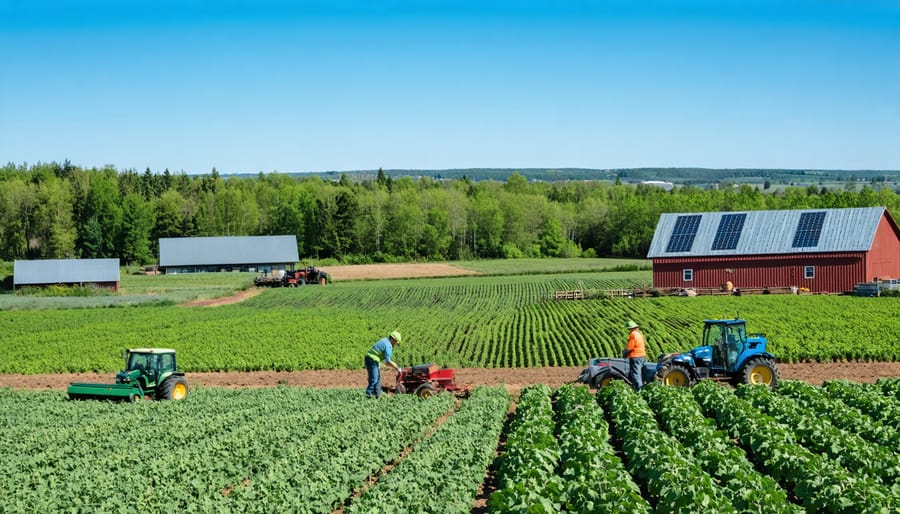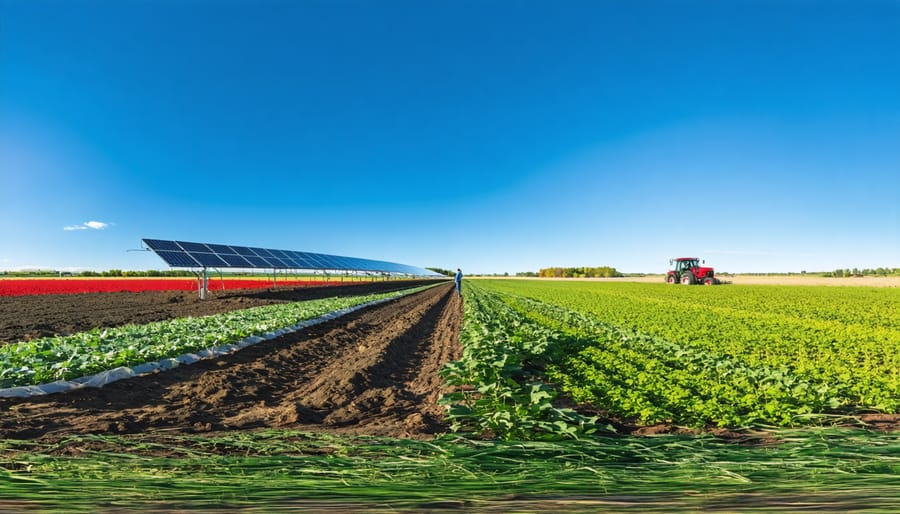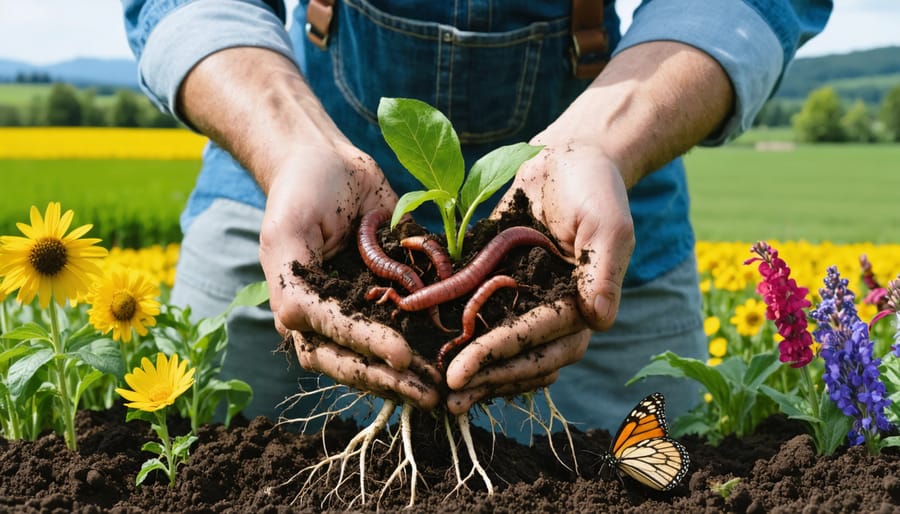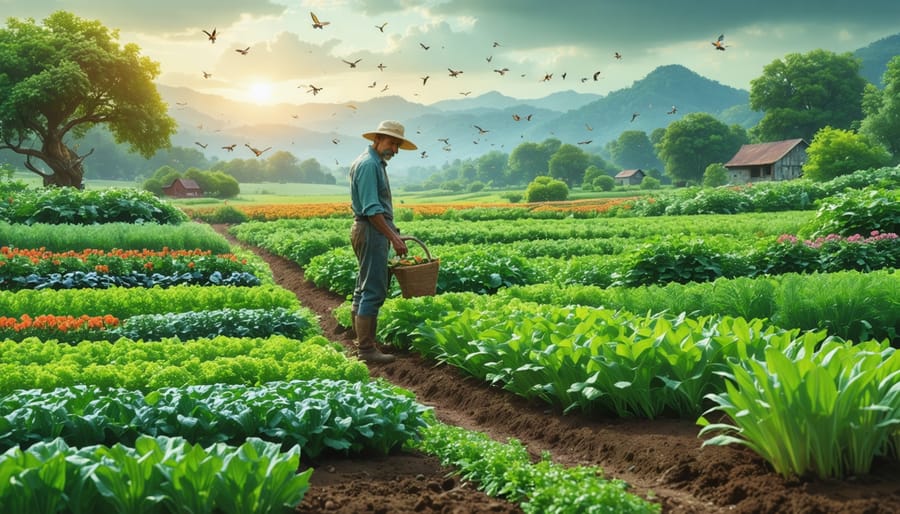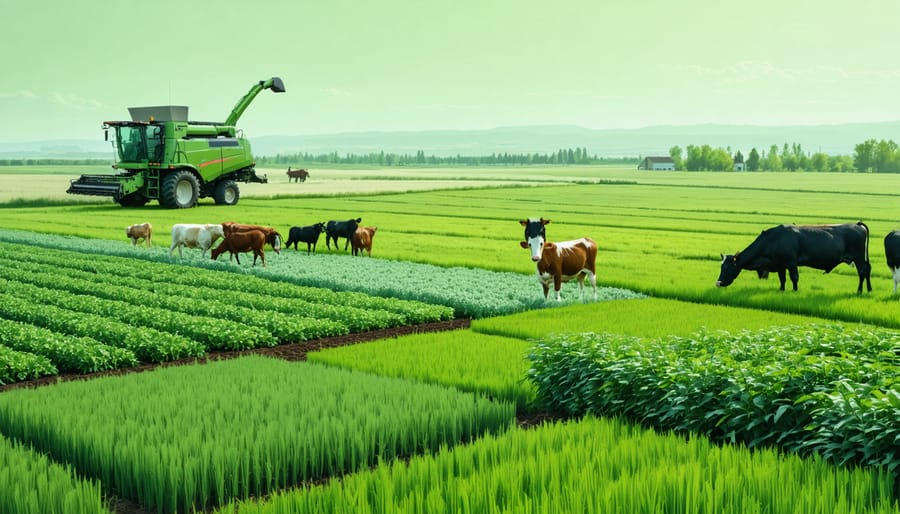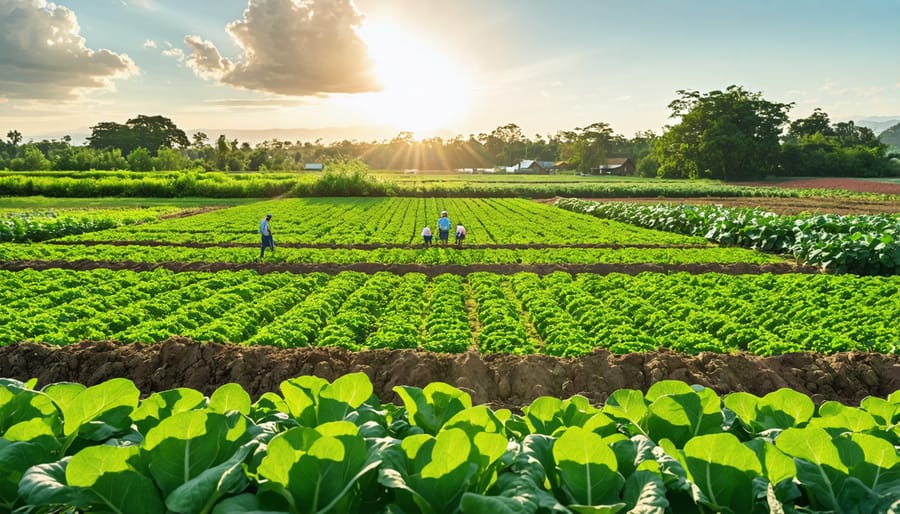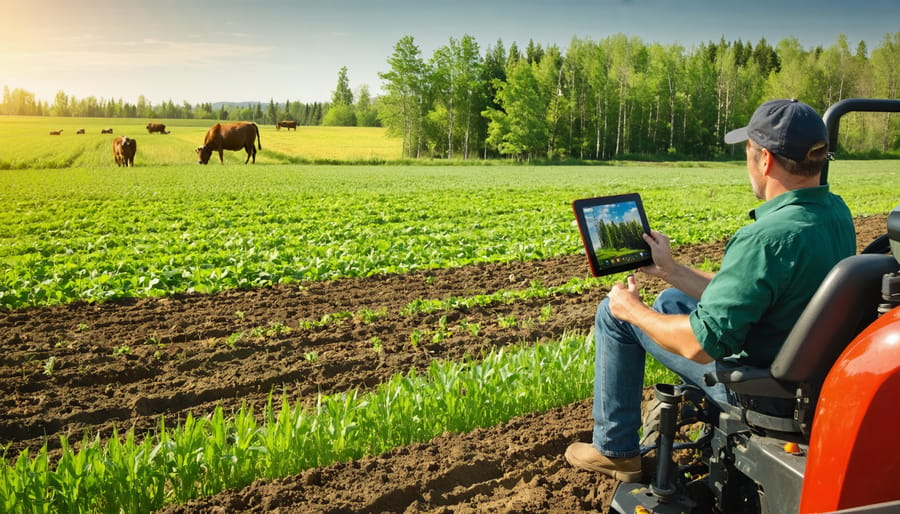Embrace regenerative agriculture practices that prioritize soil health, biodiversity, and sustainable resource management. Adopt crop rotation, cover cropping, and composting to enhance soil fertility and reduce reliance on synthetic inputs. Integrate livestock into your farming system through rotational grazing to improve pasture quality and create a closed-loop nutrient cycle. Foster a vibrant local food economy by connecting with consumers through farmers’ markets, community-supported agriculture (CSA) programs, and direct sales channels.
Understanding Organic Sustainable Farming
Benefits for Soil Health
Organic sustainable farming practices play a crucial role in improving soil health. By avoiding synthetic fertilizers and pesticides, organic farmers rely on natural methods to improve soil fertility, structure, and biodiversity. Techniques such as crop rotation, cover cropping, and composting help to build healthy, nutrient-rich soil that retains moisture and supports a diverse ecosystem of beneficial microorganisms. These practices also reduce soil erosion and compaction, allowing for better root growth and water infiltration. By prioritizing soil health, organic farmers create a resilient foundation for their crops, leading to higher yields and better quality produce. Investing in soil health not only benefits the farm’s productivity but also contributes to the long-term sustainability of the land for future generations. As more Alberta farmers adopt these practices, they are building a strong community of stewards committed to preserving the province’s agricultural heritage while embracing innovative, eco-friendly solutions.

Reducing Carbon Footprint
Organic farming practices contribute significantly to reducing greenhouse gas emissions and mitigating climate change. By eschewing synthetic fertilizers and pesticides, organic farmers minimize nitrous oxide emissions, a potent greenhouse gas. Instead, they rely on natural soil amendments like compost and cover crops, which not only improve soil health but also sequesters carbon in the soil. Organic farming also promotes biodiversity, which enhances the ecosystem’s resilience to climate change. Crop rotation and intercropping, common in organic systems, help maintain soil fertility and reduce the need for external inputs. Furthermore, organic farms often employ conservation tillage or no-till practices, which reduce soil disturbance and carbon loss. By adopting these sustainable practices, Alberta farmers can play a vital role in combating climate change while producing nutritious food for their communities.
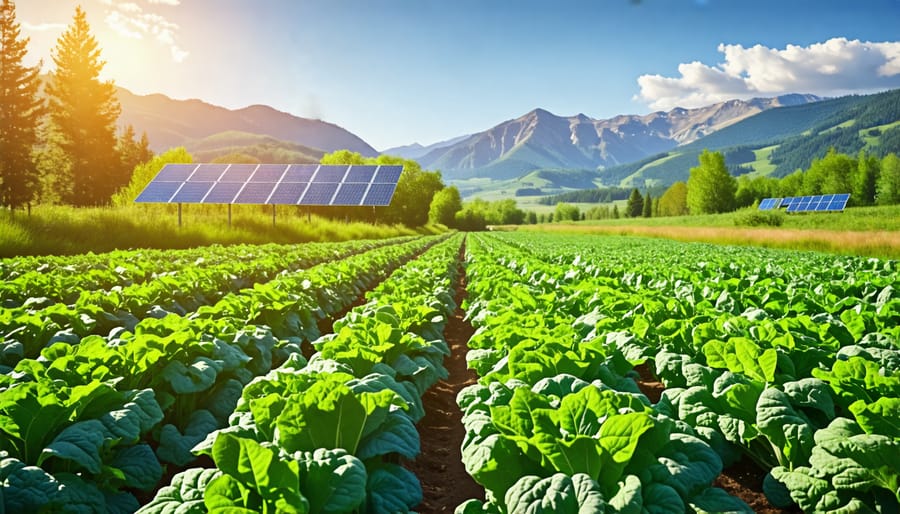
Alberta’s Organic Farming Landscape
Success Stories
Alberta has seen a growing number of farmers successfully transition to organic practices in recent years. Take, for example, the inspiring story of John and Sarah, who own a 100-acre mixed farm near Edmonton. After years of conventional farming, they decided to transition to organic practices to prioritize soil health and biodiversity. Through careful planning, training, and community support, they have not only improved the sustainability of their farm but also increased profitability by tapping into the growing demand for organic products.
Another success story comes from the heart of Alberta’s grain belt, where a group of farmers formed a cooperative to share knowledge and resources during their transition to organic. By working together, they were able to navigate the challenges of organic certification, implement innovative crop rotations, and secure stable markets for their products. Their collaborative approach has become a model for other farmers looking to make the switch.
These stories demonstrate the power of determination, education, and community in the journey towards organic sustainable farming. As more Alberta farmers embrace these practices, they are not only securing a brighter future for their own operations but also contributing to a healthier, more resilient food system for all.
Empowering Alberta’s Organic Farmers
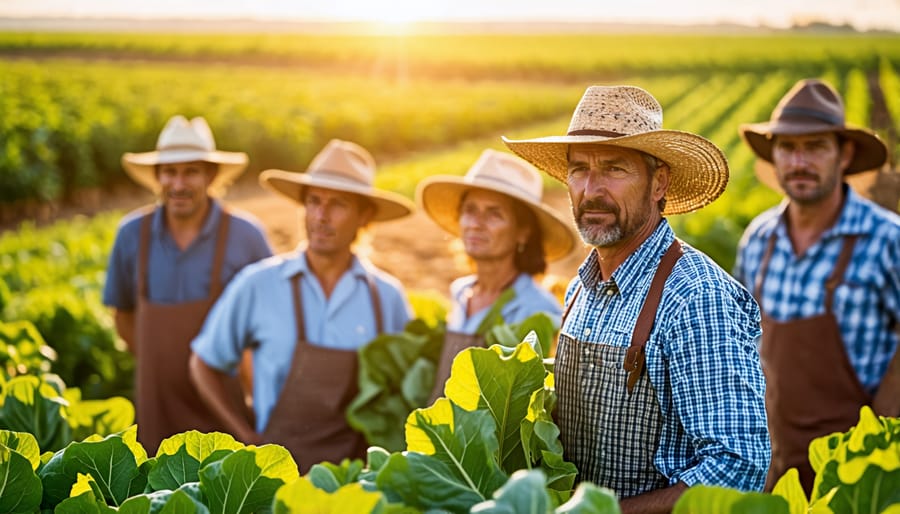
Educational Workshops and Courses
Farmers interested in transitioning to organic and sustainable practices can benefit from a wide range of educational workshops and courses offered throughout Alberta. Organizations like Organic Alberta and the Sustainable Agriculture Association provide hands-on training sessions, covering topics such as soil health, crop rotation, pest management, and organic certification processes. These workshops, often led by experienced organic farmers and agricultural experts, offer valuable insights and practical tips for implementing sustainable techniques on your farm. Many of these courses are tailored to the unique challenges and opportunities of farming in Alberta’s diverse regions, from the prairies to the foothills. In addition to in-person workshops, online courses and webinars are increasingly available, allowing farmers to learn at their own pace and connect with peers across the province. By participating in these educational opportunities, farmers can gain the knowledge and skills needed to successfully adopt organic practices and contribute to a more sustainable agricultural future in Alberta.
Funding and Grants
Financial assistance is available for Canadian farmers interested in transitioning to organic farming. The Canadian government offers grants and funding programs to support sustainable agriculture practices, such as the Canadian Agricultural Partnership (CAP) and the Organic Transition Support Program (OTSP). These initiatives provide financial aid for organic certification costs, equipment upgrades, and education. In Alberta, the Organic Alberta organization also offers resources and guidance for accessing provincial and federal funding opportunities. By leveraging these support systems, farmers can mitigate the initial costs associated with transitioning to organic methods and invest in the long-term sustainability of their operations. Engaging with local agricultural associations and attending workshops can help farmers navigate the application process and maximize their chances of securing funding. With the right financial support and community resources, Alberta farmers can confidently embrace organic practices and contribute to a more sustainable future for Canadian agriculture.
Community Support Networks
Community support networks play a vital role in the success of organic sustainable farming, particularly in Alberta. Farmers can benefit greatly from connecting with like-minded individuals who share their passion for sustainable agriculture. These networks provide opportunities for peer-to-peer learning, where farmers can exchange knowledge, experiences, and best practices. Mentorship programs, such as the Organic Alberta Mentorship Program, pair experienced organic farmers with those new to the field, fostering a supportive environment for growth and development. Additionally, joining local organizations like the Organic Alberta or the Alberta Farmers’ Market Association can help farmers stay informed about industry trends, participate in educational workshops, and collaborate with fellow organic producers. By engaging in these community support networks, Alberta farmers can strengthen their skills, expand their professional connections, and contribute to the collective growth of organic sustainable agriculture in the region.
Organic sustainable farming holds immense potential to build resilient rural communities and combat climate change in Alberta. By embracing organic practices, farmers can create a more sustainable and secure future for themselves, their families, and their communities. Transitioning to organic farming not only reduces the environmental impact of agriculture but also fosters a stronger connection between farmers and consumers, creating new opportunities for local economic growth and diversification.
Moreover, organic farming practices contribute to the fight against climate change by sequestering carbon in the soil, reducing greenhouse gas emissions, and promoting biodiversity. As stewards of the land, Alberta farmers have a unique opportunity to lead the way in mitigating the effects of climate change while ensuring the long-term viability of their agricultural operations.
The path to organic sustainable farming is not without its challenges, but the benefits far outweigh the obstacles. By tapping into the wealth of knowledge, resources, and support available within the Alberta farming community, farmers can successfully navigate the transition to organic practices. It is time for Alberta farmers to embrace organic sustainable farming and become part of the solution to the pressing environmental and social challenges we face today. Together, we can build a more resilient, sustainable, and thriving agricultural sector that benefits farmers, communities, and the planet as a whole.

